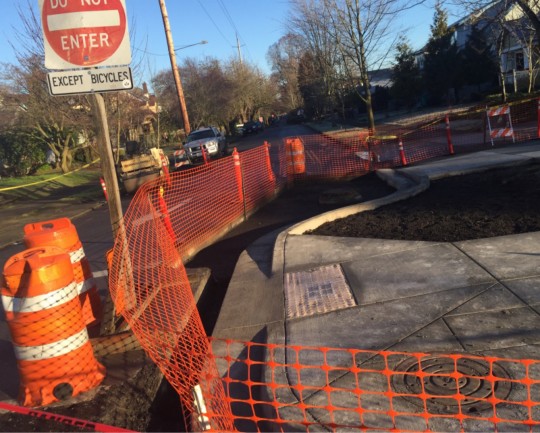
(Photos: J. Maus/BikePortland)
The other day while biking home up North Williams Avenue I got a surprise. As I crossed Killingsworth, the usual cut-through I used to enjoy was gone. Instead of the bike lane leading me to a curbside channel with a median island buffer between me and people driving in the opposite direction, I had to ride head-on into traffic. I didn’t think much of it because it was an active construction site, but I wanted to find out what was going with this very busy intersection in the north/northeast Portland bike network.
Turns out the Portland Bureau of Transportation is building new sidewalks on Killingsworth from Commercial to Martin Luther King Jr. Blvd. At Williams they’ve built a large new curb extension on the northeast corner of the intersection. Once the project wraps up in April, bicycle riders will be directed in a straight line from the existing bike lanes on Williams to the outer edge of the curb extension. You’ll note that Williams is one-way northbound south of Killingsworth and one-way southbound for driving and two-way for biking north of Killingsworth.
Here are some photos to give you a better sense of the changes that are in store.
Here’s how the intersection looks now. (Notice the location of the concrete median to the left and the curbside bike lane.):
And here’s the plan drawing from PBOT:
PBOT spokesman John Brady says, “In this particular section of Williams and Killingsworth we decided this new layout was a better design for pedestrians and bicyclists. Bikers will be able to move in a straight line through the intersection. It also works better for pedestrians and it is easy to maintain as compared to the previous island.”
As of this morning, the curblines are poured but the project isn’t quite done. Here’s how it looks as you approach northbound from existing bike lanes on Williams. Notice how the old bike lane striping leads to the right. The new design will keep the bike lane straight and will head right where those orange plastic barrels are:
Are here are three southbound views:
These changes are part of phase two of the Killingsworth Streetscape Plan which was adopted by the City of Portland in 2003. It also includes new street trees, stormwater facilities and “pedestrian scale lights.” The final recommendations in that plan also included a request from PBOT to lower the existing speed limit (set by the Oregon Department of Transportation) from today’s 30 mph to 25 mph. So far that hasn’t happened. The project is expected to be completed by April of 2016.
Brady says later this summer PBOT will pave Killingsworth from Commercial to Martin Luther King Jr Blvd. With Killingsworth being a major commercial corridor with lots of destinations (including a high school, community college, restaurants, bars, markets, coffee places, a library, and so on) we wonder if there’s an opportunity to improve bike access on the street. Killingsworth, like most of Portland’s inner commercial corridors (Mississippi, Alberta, 28th), has two standard lanes and two parking lanes — but no dedicated bicycle access.
— Jonathan Maus, (503) 706-8804 – jonathan@bikeportland.org
BikePortland can’t survive without paid subscribers. Please sign up today.



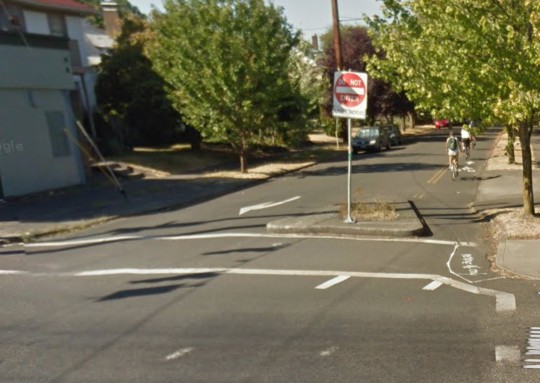
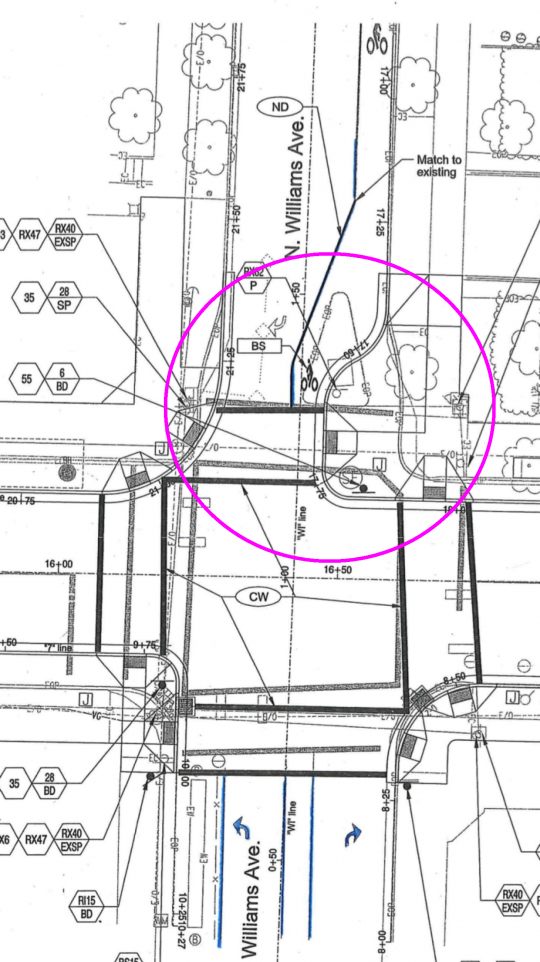
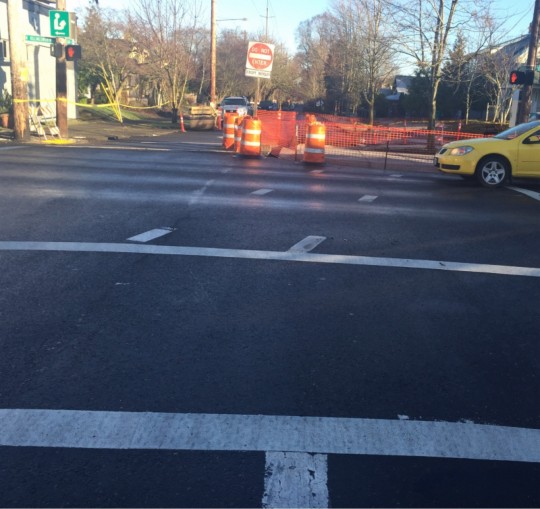
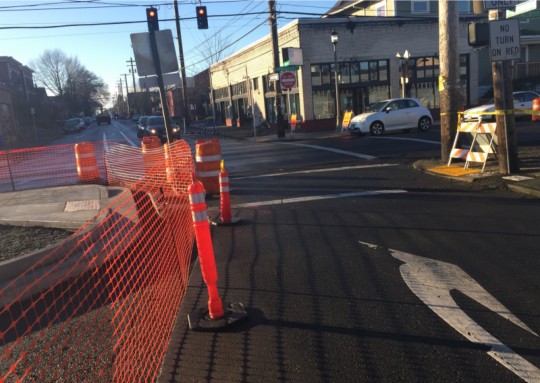

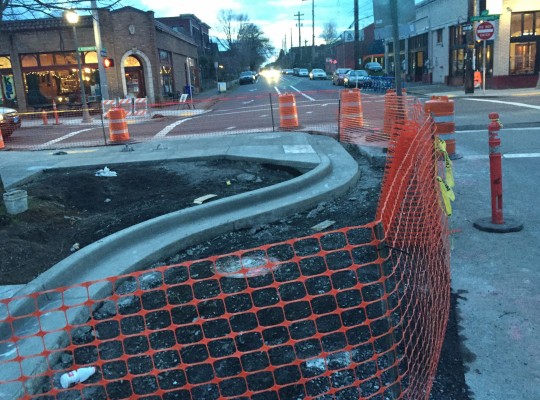
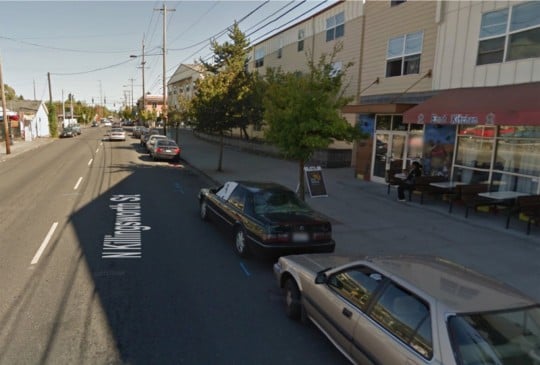
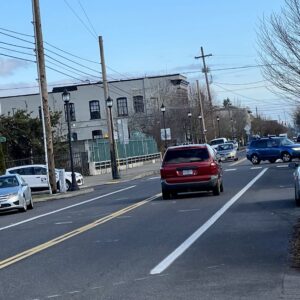
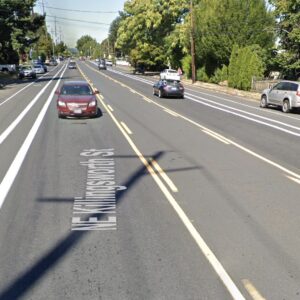

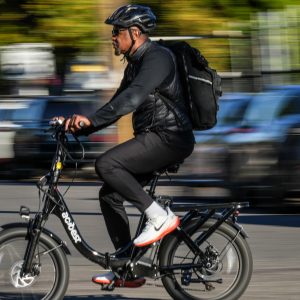
Thanks for reading.
BikePortland has served this community with independent community journalism since 2005. We rely on subscriptions from readers like you to survive. Your financial support is vital in keeping this valuable resource alive and well.
Please subscribe today to strengthen and expand our work.
This is a step backwards for bikes. Instead of a semi-protected channel to ride though, people riding bikes are now forced to ride inches from oncoming car traffic. Best practices dictate the bike lane shifting to the right with a channel cut out of the curb extension.
Additionally, the city unfortunately chose not to fix the weaving zone and bike lane sandwiched between two car turning lanes. Instead, the bike lane should shift to the right along the curb with a separate traffic signal phase for people riding bikes.
I can’t excuse the weave but the amount of oncoming traffic is a rounding error at best. It’s safer than turning into a parking lot.
There’s effectively no traffic headed southbound- at least when I’ve been there, and I visit a friend north of there a fair amount.
The weaving is tough. I prefer being in the middle, though, since it means turning drivers (and 100% of northbound drivers are turning) are out of the way.
I wish the pedestrian light had a bike light on it too, or a sign indicating “cyclists must wait for green light” (since that’s the law, afaik).
Having the bike lane between the turning lanes only moves the conflict further south. Not to mention, it’s uncomfortable being in-between two lines of cars waiting to turn. I agree with you on the need for a bike light, though.
Good to hear that southbound traffic is low. I’ve only ridden though here a few times and don’t remember what the volumes were like. Still, assuming traffic volumes will stay low is how we got into the situation with Clinton Street. This is why it’s better to build in more separation from the beginning.
Another problem here is that left turning drivers, especially during rush hour, are frequently backed up past where the bike lane crosses to the middle and end up blocking the lane. I’ve had quite a few close calls here because the angle of the cross is too shallow to make eye contact with drivers easily. I wish PBOT was fixing that part of the intersection, instead of redesigning a perfectly functional diverter.
re: southbound: there’s basically a diverter one block north of the intersection, so that street is dead-quiet.
re: mixing zone, realistically, the intersection is similar to Broadway WB at Williams/I5 onramp. Which is a super-unique intersection, and I’m glad we don’t have many of those. Plus the (actual) speeds are more tame at this intersection.
I just looked at the semi-diverter at N Williams and Jessup and I agree that it should take care of most of the southbound traffic and discourage cut-thoughs. Still think a wider bump-out with a bike lane channel through it would be more comfortable though.
The Broadway and Williams intersection you mentioned is poorly designed. Even with the crossbike striping, having bike and car lanes cross at such a sharp angle is dangerous. Not to mention that this occurs two blocks in a row, since the right turn lane becomes the straight lane in the next block, forcing drivers to drive over the bike lane. The fact that Williams’ bike lane was incorrectly built on the left side of the road is the cause of the weaving issue here. Ideally, you’d have all lanes shift to the right to avoid crossovers, with a bike-specific signal phase to avoid right-hooks.
Yes, please get a bike light that cycles with the walk signal crossing Killingsworth. I ride through this intersection daily and feel guilty and sometimes shamed by others for doing something safe and logical: crossing the street without any oncoming vehicular or pedestrian cross-traffic. How much do bike signals cost?
Oh, and Alberta too:)
When added to a signal rebuild, maybe $1,000. When added to an existing signal, closer to $10,000. At this intersection the north-south pedestrian head gets a 3-5 second head start, while the bike rider is a vehicle.
Waiting for the green signal should be the safest choice, if not the most convenient.
What’s convenient about waiting 5 seconds with absolutely no benefit?
Thanks for the info. In grand scheme this annoyance is minor, but still don’t understand why unnecessarily impeding traffic flow makes it safest/most convenient. Further, wonder if the forced stop at Killingsworth is a design feature or bad planning. (Impossible to make that light heading north from Alberta) Can you explain?
Ah, just noticed the related article from Nov 2014. I’ll read through the comments next time I need to procrastinate. Back to work.
What? No traffic. BS. There is a ton of head on traffic. PCC rush hour is a major problem. And head on traffic is just part of the problem. Bikes should not have to weave. This new design is making this less safe.
If you keep advocating for bike lanes, don’t be surprised or angry when they end badly. They ALWAYS end badly.
You know who doesn’t get squeezed by the car to their left? The person with the car behind them.
Thank you PBOT!
After a decade of using the Williams/Vancouver couplet, last October, as part of my NWEI EcoChallenge to spend more time outdoors and wandering the neighborhoods, I switched to Rodney. Most days and times, I have the street to myself. So I sing to the goats.
I would appreciate some improvements on Rodney, it is less stressful than Williams and Vancouver.
I too, refuse to ride on Williams. If a bike “improvement” project causes people to adjust their commutes to avoid it, then it should be considered a complete failure.
so now your personal decisions are the metric of what constitutes a failure?
No, but the collective decisions of the public this project is meant to serve are. And there is a significant consensus that the Williams bike lane has created more problems than it solves. Just read any comment thread about it.
It is only a matter of time before someone is killed in the wrong side bike land. making this lane different from every other in town is a really dumb decision.
bike lane.
Comment threads generally attract people who complain. I wouldn’t say it is a valid sample population.
During the redesign process of Williams, stakeholders + staff realized Williams had a long way to go before it would be for riders 8-80. Fortunately this concern was put into action and Rodney has received (and will receive more) improvements to provide people on bikes of all types different choices for their biking needs. I find Williams to be much improved after commuting on the old version for many years, but I appreciate not everyone feels that way and it’s great we have more options and that more folks are discovering Rodney is their preferred route.
Thanks for this update!
It is great to hear about the pedestrian improvements/safety updates coming to Killingsworth! This intersection seems like a lateral move to me, but coupled with slower speeds (hopefully) and other cues to drivers to pay more attention, this should be a big improvement for everyone!
True on the cutout for the bike lane between the bike lane and the oncoming traffic. Motorists always like to make a country corner is a curb is not present. It will probably take 4 or 5 cyclists going over headlights and through the driver’s windshields before PBOT notices.
The entry into the intersection between the right and left turn lanes has always been well thought out for cyclists. One of the best and safest for cyclists from my experience. No right or left hooks!
Looks like the pinch point for the bike lane will be about 1′ wide. How did this get approved?
Also, I rode through here a couple of weeks ago when they had just started the construction. No detour signs, and no routing for northbound bike traffic. I was very confused and ended up having to cross oncoming traffic and ride up on the sidewalk, then back down over the curb and across the street to continue. Seriously, WTF?
It’s at least 6 foot wide.
Source?
City Standard?
The plan provided at the beginning of the story?
The depicted lane centerline is one or two feet west of the street centerline. The street is 28 feet wide, so that left half is 14 feet striped down to 12 or 13 feet.
I wouldn’t hold the city to its standards. And it appears that your statement was made via inference, not facts. If you have something that definitely proves that this will be “at least” 6 foot-wide, I’d like to see it.
Another pedestrian improvement masquerading as a bike improvement???
Curb extensions at signalized crosswalks on a 28 foot wide residential street are redundant and PBOT typically does not spend tax dollars on such things.
Explain the redundant general travel lanes on most of the city’s arterials and commercial corridors.
Redundant by what measure? 1950’s traffic design?
If the peak hour has more than 1,000 vehicles for one direction, by current standards that direction needs more than one lane for acceptable operation. And Portland isn’t exactly a car friendly city, like Houston or Atlanta, or LA.
Judging past design by current standards is like judging past eras by modern sensibilities, mental exercise with no benefit.
You are the one who is claiming PBOT doesn’t spend tax money on redundant things, which is pretty false.
Redundant can mean “exceeding what is necessary,” in which case, most of the arterial roads, commercial corridors, downtown streets, highways, parking lots, parking ramps, etc. are redundant most of the time. Even state highways like MLK and 82nd have so little use during many parts of the day that the majority of the width of the road is redundant during those times.
PBOT has also had opportunities to remove redundancies while improving access to people. Take SE Morrison as an example. It was fairly recently repaved, but no one took the initiative to remove some of the redundant lanes to convert to bike lanes and wider sidewalks.
I think you meant to say that PBOT doesn’t spend money on redundant ped / bike infrastructure. Because, as everyone can see, they spend a whole lot of money keeping the status quo of redundancy on most of the roads, with nary a thought to active transportation.
Also, just because there are 1,000 vehicles per hour per direction does not mean the street width / lane configuration is necessary. Sorry, but vehicle throughput / speed is not one of “the basic requirements of life” and is therefore not necessary.
Here’s something to think about: The naked bike ride moves about 10,000 vehicles per hour per direction through narrow residential streets. Also, the route changes every year, so it’s possible than any given road could be used for the route. Does that then mean that PBOT should build and maintin 10 bike lanes per direction on every road at all times? (because, at some point, 10,000 people will potentially all bike down it at the same time). It follows the same logic and math that you’re using to defend the wide lanes on wide roads.
I saw this work zone a week ago (I have been meaning to post it) and was shocked that there were no advance warnings about the diversion or the full bike lane closure with detour as cyclists approach from the south. I saw many a cyclist ride into oncoming south bound traffic. (The except bikes sign under the do not enter sign was not bagged.)
Is this not one of Portland’s major bikeways per bike volume. (I guess Portland does not have Platinum TCPs / work zone inspections yet?!)
I was surprised too given what a popular bikeway this is and given the fact that the current situation essentially directs bicycling traffic directly into oncoming traffic.
you say “oncoming traffic”, but you’re basically entering a cul-de-sac.
Fact is Ted that this is a street that people drive southbound on. I don’t care if only a few people do it a day… It only takes one of person driving a car — or the mere threat of the presence of a car — to increase the stress at this juncture and create a chance of injury/death if something goes wrong.
I have shared the photos I took 10 days ago with BTA, PBoT, Portland PBAC, and BP.
This is a major bike way with hundreds of people on bikes passing 3 to 7 pm.
Hmm… to me, it looks like all of this work will easily be undone by anyone parking a car just North of the intersection. Yeah, yeah, I know they’re not supposed to, but that doesn’t stop anyone from parking in the bike lane at Ankeny and 32nd. What’s to stop people from parking in the bike lane here and forcing people on bikes to head into oncoming traffic?
And, as other people pointed out, no detour route or anything? Seriously? This is the most used bike lane in the whole city. You would think that PBOT could at least do something to notify people biking and walking about the changes, while restricting driving during the construction to alleviate conflicts.
Also, since Killingsworth is getting re-paved, shouldn’t that mean they need to add bike lanes? I am very confused by this. It seems when there is a re-paving project, the city doesn’t add bike lanes. If there’s a rebuilding project, the city (or state) says that there’s not enough room / money to add bike lanes. So when are they supposed to add bike lanes? Only when they feel like it?
Or someone sues them to enforce the provisions of the state ‘bicycle bill.’
AFAIK, that’s only happened once, when the BTA sued for bike infra through the Rose Quarter.
point of fact, nothing, but then you can have the satisfaction of calling parking patrol to issue a citation.
BTW, the ‘oncoming traffic’ might be 30 cars a day.
I don’t know what half of your comment means, but unless you did a count, I suspect your numbers aren’t accurate. I ride through here occasionally, and I have seen more than 5 cars go through that light (southbound) during one signal phase before.
This route is used as a cut-through for drivers avoiding PCC, especially for drivers who don’t want to have to turn left off of Killingsworth. I’ve seen it happen before.
paikiala,
thanks for the traffic volume estimate… but like i said above to Ted… in my mind that does not minimize the threat – real or perceived.
Thanks for the details/info BikePortland. I live two blocks south of this intersection, on Williams, and wondered what exactly the plan was. I cross this intersection on foot and bike daily.
The old design I thought was ok, and the new design does appear to have a pinch point at the crosswalk, but we’ll see. There is hardly ever southbound auto traffic (turning onto Killingsworth), not at the current levels of density north of Killingsworth.
I too started using Rodney for my northbound trips instead of Williams, unless of course I’m making stops on Williams. This probably has less to do with a feeling of safety, as the crossings at Tillamook, Fremont, Shaver, Skidmore and Alberta are a pain. Rodney offers ample space. I rarely find myself traveling with someone in the same direction, and there’s a little more of an incline to provide a little more exercise.
This looks strikingly similar to the treatment at 53rd and east Burnside. The problem is that there are no physical barriers preventing driving from driving in the “bike only” space. Drivers at 53rd and Burnside are constantly driving past the diverter. Provided no one is coming the other way, there is nothing keeping them from doing so. I expect we will see an uptick in drivers continuing north on Williams past Killingsworth.
Normally I agree about weak diverters but in this case it is reinforced by a physical barricade on the next block up. It’s a lousy shortcut to anything but street parking on that block. Street parking itself is pretty useless because the homes back up to an alley.
Chris,
And, of course, you’ve contacted 823-SAFE to request enforcement of these violations you’ve witnessed, with a time of day to target?
I haven’t requested enforcement in this area. But I have in other areas, like SW 2nd and Ash. I called them several times with no response. That was over 2 years ago.
Have they ever done enforcement there? I don’t think so. If they have, no one told me about it.
Similarly with other intersections (NE Broadway and 6th, Multnomah and 6th, NE Sandy and Lawrence, Grand / MLK and Hassalo, Grand and Pacific, etc.)
No response about any of them. And no enforcement actions that I’ve heard of.
“…I called them several times with no response.”
You called 823-SAFE and got no response? Difficult to believe.
And unless you waited on site 24/7, I don’t see how you would observe enforcement.
Lastly, as part of your request for enforcement to 823-SAFE, you can request the enforcement staff contact you with what was found.
“You called 823-SAFE and got no response? Difficult to believe.”
They have really gone downhill. You used to be able to get a response within 3 days. Most of my most recent calls have gone unanswered.
“And unless you waited on site 24/7, I don’t see how you would observe enforcement.”
I requested enforcement during PM rush hour during weekdays. For SW 2nd and Ash, I walked through there every single weekday for over a year, with no enforcement. Similarly with the other locations.
“Lastly, as part of your request for enforcement to 823-SAFE, you can request the enforcement staff contact you with what was found.”
Yeah, in theory. But if they don’t do any enforcement, they won’t ever get back to you.
Give me a break. If PBOT had listened to us at the open house, this wouldn’t be an issue.
Chris,
“this’ being your imaginary future increase in violations of the do not enter signs?
“Bad men need nothing more to compass their ends, than that good men should look on and do nothing.” – Stuart Mill
“imaginary”? Really?
Previously, there were no cars entering there against a traffic control device. Now there are. That’s an actual increase, not imaginary.
No cars entering 53rd at Burnside doesn’t make sense, since it did not have such restrictions in the past, so you must mean N Williams at Killingsworth.
I don’t see how anyone can believe a blanket statement that no one ever violated a diverter in the past. PBOT knows people disobey traffic control devices, as should everyone else. So, I question how you could even write such a statement, rationally.
The imaginary part is that people will be doing so more in the future than in the past. That is just fear talking.
“No cars entering 53rd at Burnside doesn’t make sense, since it did not have such restrictions in the past, so you must mean N Williams at Killingsworth.”
No, I am referring to 53rd and Burnside. Like I said, previously there weren’t any drivers disobeying that traffic control device (because it didn’t exist).
Now that it exists, drivers disobey it all of the time. As the poster above stated, this could have been fixed before it was built. The design chosen was a bad one.
“I don’t see how anyone can believe a blanket statement that no one ever violated a diverter in the past.”
No one is saying that. At all.
“PBOT knows people disobey traffic control devices, as should everyone else.”
PBOT should have built the bikeways with that thinking in mind. They appear to have not. That is why many people disobey the traffic control devices at the previously mentioned location. If it had been built better, it wouldn’t be an issue.
“The imaginary part is that people will be doing so more in the future than in the past. That is just fear talking.”
There is a world of difference between stating as a fact that there will be an increase versus what the poster actually said: “I EXPECT we will see an uptick in drivers continuing north on Williams past Killingsworth.” (emphasis mine).
As has been pointed out before, people will disobey the traffic control device(s). Assuming or expecting an increase in law breaking behavior from motorists is a reasonable assumption, given the mounds of evidence showing that drivers will drive where they want, regardless of signage. If you think otherwise, take a look at the transit mall during rush hour. I bet you couldn’t go 10 minutes without seeing a driver in the train lane. Sure, fear is talking. But it is a reasonable fear.
I have almost always ridden on the wrong side of the old diverter so that I could continue in a straight line. I can’t imagine that I was the only one. Seems like a correction of a basic design flaw.
You weren’t the only one. I agree with you. I also used to ride south on this block of Williams before cutting over to Vancouver. The cut-through at the other end of the block could use re-engineering, too.
The diverter at Williams and Jessup is the *original* one, prior to the circa 1997 bike lane installation on Williams/Vancouver that moved the traffic diversion point on Williams one long block upstream to Killingsworth. Not sure that the original diverter has much of a useful function now.
Tony,
Don’t tell Ethan.
What is that supposed to mean? It sounds like it’s some form of a personal attack.
Yep, me too.
FYI: The 2030 Bicycle Plan calls for separated in-roadway bicycle for that stretch of Killingsworth. That could be as simple as bike lanes when it’s resurfaced.
Clint,
Parking would need to be removed, probably on both sides.
And we all know PBOT won’t allow that!
I believe the sidewalk/streetscape improvements along Killingsworth are funded by the PDC using Interstate URA dollars. The segments to the west as far as Interstate Avenue were done several years ago. Speeds here should be lowered to 20 mph as there is a ton of street life with PCC, etc.
Arguments can be made that this design is bad, but these changes look like an improvement to the existing implementation of the design. The only thing I would add would be a curb or bollards to mark the west edge of the Northbound bike lane as it passes the new sidewalk bump-out, at least up to where the northern point of the existing raised triangle is.
Curb might be passable by a fire truck or ambulance, but not a bollard. Either would present an object that some cyclist will eventually hit.
The proposal looks similar to the Lincoln or Clinton crossings of Chavez.
Why would the curb need to be mountable? Surely, if there are only 30 cars per day in this location, the fire truck and ambulance could simply use the oncoming traffic lane to access the street.
That is, unless you were just pulling the 30 cars per day off the top of your head and you actually have no data to back up that up.
“Either would present an object that some cyclist will eventually hit.”
Well, now, doesn’t the bump-out itself present an object that some cyclist will eventually hit? Isn’t the current design just an object waiting to be hit? Wouldn’t all means of protection of any bike lane anywhere “present an object that some cyclist will eventually hit”?
All I’m thinking of is that if I had to enter this contraflow bike lane, it might be nice if there were some means of preventing oncoming cars from “drifting” into the bike lane and blocking it as they wait for their turn. Or really, I guess, failing to drift back to the right after they’ve been going around all those parked cars. The layout here is a funnel for cars approaching from the North. The edge of the funnel shouldn’t be across the bike lane; the edge of the funnel should keep cars out of the bike lane. In the old layout, if a driver kept going straight instead of moving right, they would hump over the corner of the triangular island, but still be pretty far away from the bike lane. With the new design, if a driver goes straight while approaching the intersection, the first thing they would hit would be a bicyclist entering the contraflow lane.
Unless…parking were moved to the other side to create a parking-protected contraflow bike lane… That would keep drivers to the right the whole way along. No more funnel. Granted, it would still put driver’s-side doors in the bike lane, but there would be more of a chance someone about to open a door would see a bicyclist coming.
The new design is less safe.
How about Killingsworth in the Cully neighborhood ??
You have to ride it to see how bad it has become. PBOT is incompetent. They are about to make Southbound interstate worse. What a waste of money to make this less safe for bikes. So depressing.
the bike lane approaching Killingsworth is now completely blocked by orange drums intended to close off the left turning lane for cars. Way to go PDOT !